Got a Sweet Tooth? You'll LOVE this Information!

Trick or Treat starts it and it doesn't let up until after Easter-I'm talking about the sugar binge America indulges in. So here's a related question: Do all sugars give you cavities?
The answer is good news for those of us with a sweet tooth: "NO, not all sugars create cavities." In fact, two in particular are shown to be good for teeth. (This is wonderful news as we move through sugar-binge season!)
But now for the bad news: the sugars we probably enjoy the most aren't on that list.
Here's what I found in my latest Care2 newsletter: Research says the REAL "bad" guys are:
· table sugar (sucrose)
· brown sugar
· corn syrup (glucose)
· high fructose corn syrup
No surprises there, but science says "natural" sweeteners cause decay as well:
- honey
· maple syrup
· agave nectar (fructose)
· brown rice syrup (maltose)
· milk sugar (lactose)
· cane sugar
- molasses
· sorghum syrup
· trehalose (a natural preservative used in some foods)
· galactose (tough to digest)
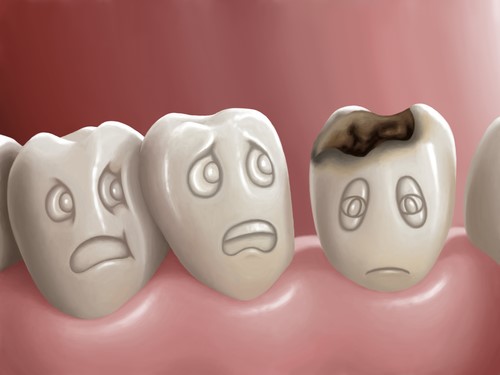
You probably know why sugar rots teeth: They fuel bacteria that naturally live in tooth plaque. These bacteria feed on carbohydrates (which sugars are) and produce acid as a byproduct through a process of simple fermentation. The acid slowly eats away at the tooth enamel, causing rot.
And we all know that regularly brushing starves bacteria and keeps decay under control. But even if brushing isn't possible, drinking water or rinsing your mouth out with water after eating neutralizes the effects of acidic and sugary foods.
OK, now we know which sugars to police. But which are the "good" guys, the ones that are good for teeth?
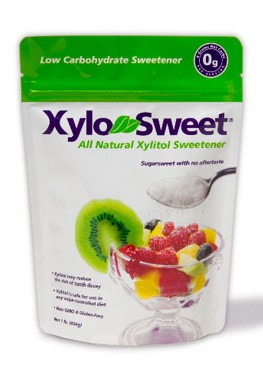
XYLITOL (Xylosweet). Xylitol is synthesized from corncobs and birch trees and can help re-mineralize tooth enamel. It's now found in chewing gum and candy. (Watch out, though: it's poisonous to dogs.)
I like xylitol. I've done of bit of baking and treat-making with it. I've found it has a "cool" aftertaste, which is quite pleasant. It has about 30% less calories than sugar and is low on the glycemic index. Be aware, though, that it can be challenging for some to digest. (You can find it at health and whole-foods stores, and some grocery stores now carry it.)
One of my favorite health-oriented websites, Elana's Pantry (www.elanaspantry.com) advocates for also. She's done lots of experimenting with it and has a recipe for xylitol-sweetened fudge that we really like. See what you think:
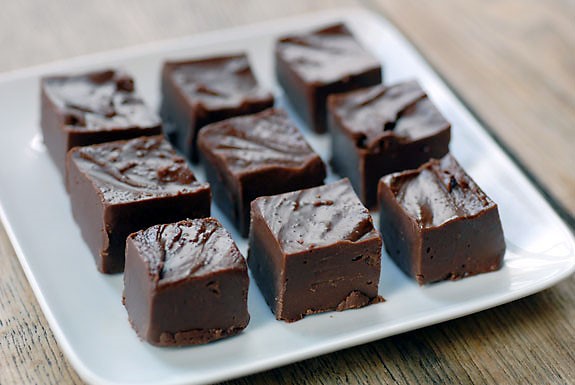
CHOCOLATE PEANUT BUTTER FUDGE (yield: 24 squares)
1(16 ounce) package semi-sweet chocolate chips
1 cup old fashioned peanut butter (creamy is preferred)
2 tablespoons xylitol
1 tablespoon vanilla extract
¼ teaspoon celtic sea salt (any salt will work)
¾ cup nuts (optional; roughly chopped)
Melt chocolate in a medium pot. Remove from heat then stir in peanut butter and xylitol. Once xylitol is incorporated, stir in vanilla, salt, and nuts (if desired). Spread into a 1 ½ quart loaf pan. Refrigerate for 2 hours. Cut and serve immediately; store in the freezer in an airtight container.
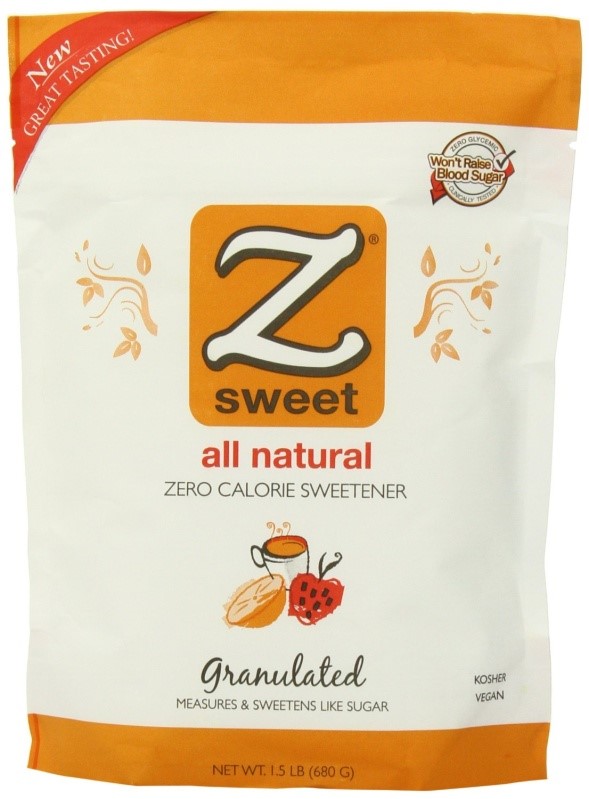
ERYTHRITOL (Zsweet). It's is 60-80% as sweet as table sugar. It's used primarily in chewing gum, baked goods and beverages, and occurs naturally in pears, soy sauce, wine, sake, watermelon, and grapes. It can't be metabolized by the bacteria in the mouth, which is why it doesn't cause cavities.
There are a few other sugars that aren't linked to cavities:
· lucuma powder
· monk fruit
- lactitol
- sorbitol
- mannitol
· glycerol (or glycerin)
· Truvia (rebaudioside)
· Sweet Leaf (stevia leaf powder)
However , some of them have other undesirable side effects. For example, very large doses of mannitol can damage the kidneys and heart. High doses of glycerol can cause nausea and dizziness. And Truvia and Sweet Leaf just haven't been tested enough to understand what, if any, serious side effects they might have (so cautionary use is advised).
And what about artificial sweeteners?
· Sweet'nLow (saccharin)
· Splenda (sucralose)
· Equal (aspartame)
- Advantame
- Neotame
· Acesulfame potassium.
While none of them have been linked to tooth decay, research does show that saccharin, sucralose and aspartame cause stomach upset. And aspartame tops the list of sugar substitutes to avoid, because studies show it causes cancer. In fact, science it heavily questioning the health safety of the other artificial sweeteners as well.
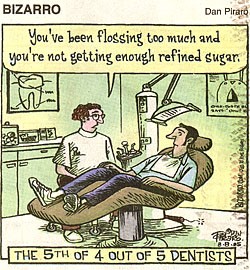
So the bottomline? The dentists have it:
ü If you like sugar, eat a little-NOT a lot. (Tame that sweet tooth.)
ü Limit sugary foods and carbohydrates that are likely to stick to teeth. Toffee sticks; apples don't.
ü Brush and floss morning and night to remove the food hiding between teeth that's feeding the bacteria (and causing decay).
ü If you can't brush, at least rinse to remove excess food particles and sugars.
ü Treat sugary sodas, fruit juices and energy drinks the same way you would candy and other food: brush and rinse after you drink them so their sweet residue doesn't stick around in your mouth.
But my bottomline? If you've got a sweet tooth, until you can tame it, give xylitol and erythritol a try. They're good for teeth-nice to know as we move through sugar-binge season.
- www.dailymail.co.uk
- www.hussongdentistry.com
- www.greenmomsmeet.com
- www.elanaspantry.com
- www.amazon.com
- www.amfor.net
 Alice Osborne
Alice Osborne
Weekly Newsletter Contributor since 2006
Email the author! alice@dvo.com
